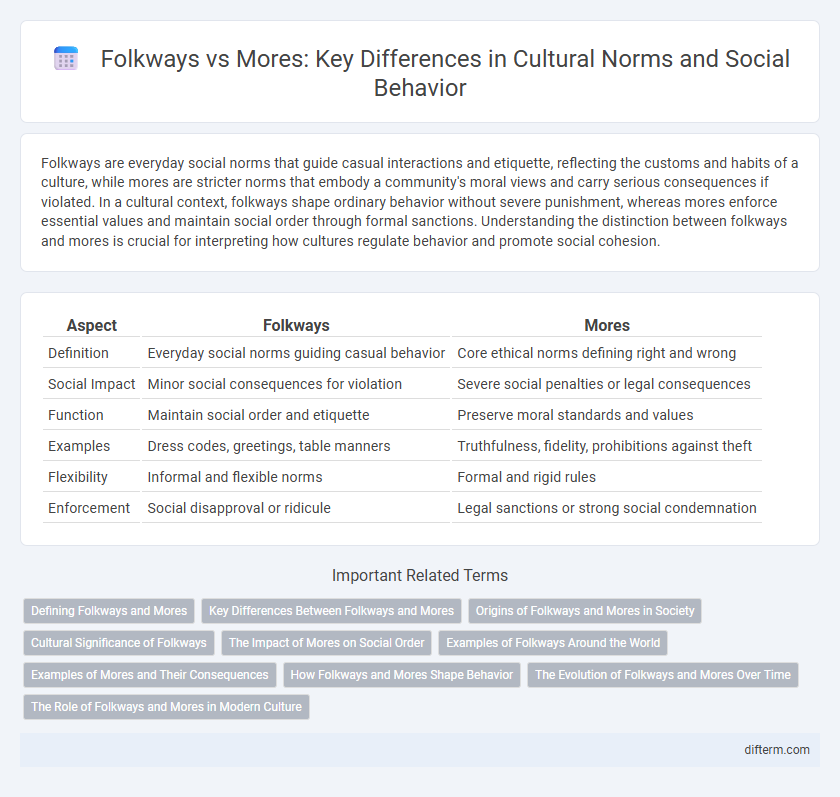Folkways are everyday social norms that guide casual interactions and etiquette, reflecting the customs and habits of a culture, while mores are stricter norms that embody a community's moral views and carry serious consequences if violated. In a cultural context, folkways shape ordinary behavior without severe punishment, whereas mores enforce essential values and maintain social order through formal sanctions. Understanding the distinction between folkways and mores is crucial for interpreting how cultures regulate behavior and promote social cohesion.
Table of Comparison
| Aspect | Folkways | Mores |
|---|---|---|
| Definition | Everyday social norms guiding casual behavior | Core ethical norms defining right and wrong |
| Social Impact | Minor social consequences for violation | Severe social penalties or legal consequences |
| Function | Maintain social order and etiquette | Preserve moral standards and values |
| Examples | Dress codes, greetings, table manners | Truthfulness, fidelity, prohibitions against theft |
| Flexibility | Informal and flexible norms | Formal and rigid rules |
| Enforcement | Social disapproval or ridicule | Legal sanctions or strong social condemnation |
Defining Folkways and Mores
Folkways are informal social norms that govern everyday behavior, representing customary practices people follow without serious consequences for violations. Mores are stronger cultural rules based on moral values, embodying what a society deems essential for social order and often invoking severe sanctions when broken. Understanding the distinction between folkways and mores highlights how cultures maintain cohesion through varying levels of social expectations and control.
Key Differences Between Folkways and Mores
Folkways are informal norms governing everyday behavior, such as dress codes or table manners, which, when violated, result in mild social disapproval. Mores represent deeply held moral norms essential to societal values, and their violation often leads to severe sanctions or legal penalties. The key difference lies in the degree of social importance and the consequences attached to breaking folkways versus mores.
Origins of Folkways and Mores in Society
Folkways originate from everyday social interactions and customary practices that guide routine behavior in a society, reflecting the collective habits passed down through generations. Mores develop from deeply held moral values and societal norms that dictate notions of right and wrong, often enforced through formal or informal sanctions. Both folkways and mores evolve as society adapts, rooted in cultural traditions and shared historical experiences that shape social cohesion and identity.
Cultural Significance of Folkways
Folkways represent informal cultural norms governing everyday behavior, reflecting the habitual practices and social rituals within a community. These unwritten rules maintain social harmony by promoting predictable interactions and fostering a sense of belonging. Their cultural significance lies in reinforcing group identity and transmitting shared values across generations without formal sanctions.
The Impact of Mores on Social Order
Mores, as deeply held cultural norms, exert a significant influence on social order by delineating behaviors considered essential for societal cohesion and stability. Violations of mores often result in strong social sanctions, reinforcing collective values and maintaining moral boundaries within the community. These unwritten yet powerful rules shape societal expectations and contribute to the preservation of cultural identity over time.
Examples of Folkways Around the World
Folkways, informal norms guiding everyday behavior, vary widely across cultures, such as bowing in Japan to show respect, tipping customs in the United States, or removing shoes before entering a home in many Middle Eastern and Asian countries. These practices influence social interactions without carrying severe consequences if violated. Unlike mores, which govern morally significant behaviors, folkways maintain social order through subtle, culturally specific rituals.
Examples of Mores and Their Consequences
Mores are strong social norms that dictate moral behavior and often carry severe consequences when violated, such as laws against theft or murder resulting in legal punishment and social ostracism. For instance, in many cultures, incestuous relationships are considered mores and can lead to familial rejection or criminal charges. Violating mores typically leads to harsh sanctions that reinforce a society's moral code and preserve social order.
How Folkways and Mores Shape Behavior
Folkways and mores are fundamental cultural norms that shape individual and collective behavior by guiding social expectations and interactions. Folkways govern everyday casual behaviors, such as dress codes and table manners, ensuring smooth social functioning without severe penalties for violations. Mores carry stronger moral significance, regulating actions related to ethics and social order, with violations often resulting in formal sanctions or social ostracism.
The Evolution of Folkways and Mores Over Time
Folkways and mores have evolved significantly, reflecting changes in societal values and norms over time. Folkways, encompassing everyday customs and etiquette, adapt more fluidly to cultural shifts, while mores, representing core ethical standards, tend to change more slowly but profoundly. This evolution highlights the dynamic nature of culture in balancing tradition with social progress.
The Role of Folkways and Mores in Modern Culture
Folkways guide everyday social interactions by shaping customary behaviors that maintain social order without strict enforcement, while mores represent core values and moral standards essential for societal cohesion, often backed by formal sanctions. In modern culture, folkways facilitate smooth interpersonal relationships and cultural continuity through informal norms, whereas mores uphold fundamental ethical principles that influence laws and collective conscience. Understanding the interplay between folkways and mores reveals how social norms evolve to balance tradition and change in contemporary societies.
folkways vs mores Infographic

 difterm.com
difterm.com